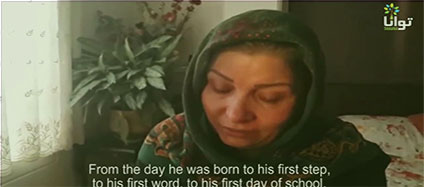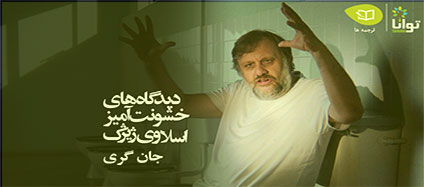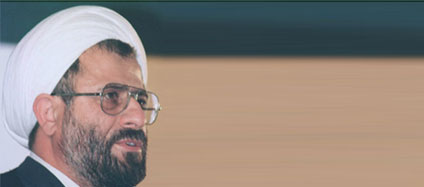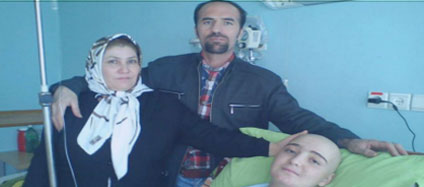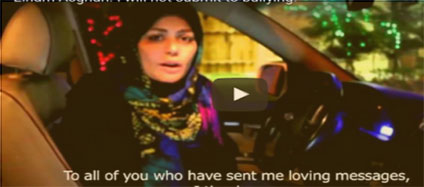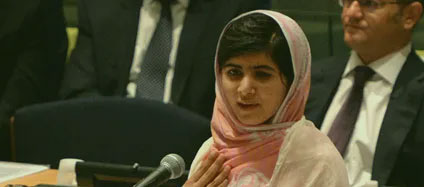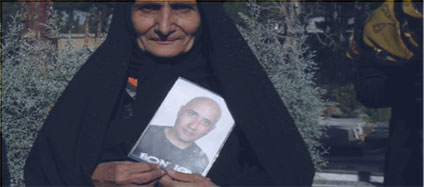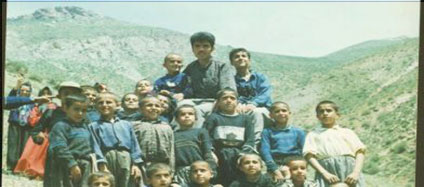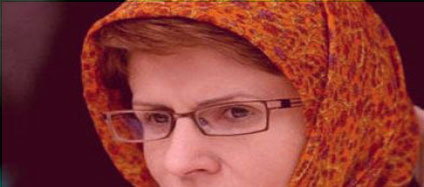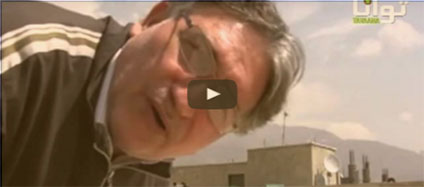Zia Nabavi, dressed in a light blue button-up shirt, stands facing into the sun in front of a body of water.
In this letter, written in April 2012, Zia Nabavi, a student exiled to Karun Prison in Ahwaz, describes the torture he underwent during interrogations.
“I was under physical and psychological pressure during all of my interrogation sessions”, says Zia Nabavi, a student exiled to Karun Prison in Ahwaz [southwest of Iran], in a letter to Mohammad Javad Larijani.
He writes, “In two successive sessions of interrogation, I was forced to repeatedly squat to the point that I was unable to walk for three days, and I sweated for a week due to the continual pain in my legs. If I disobeyed the interrogator’s orders, he would kick me on my calves. When the interrogation session was over, I was threatened with execution because my interrogator was not satisfied with my written confessions.”
According to Kalameh, (a news site close to Mir Hossein Mousavi) he emphasized, “Unfortunately, the Ministry of Intelligence report considers my interrogations worthless, due to a lack of confessions and testimony. The judge was advised not to pay attention to the confessions. Usually, when I think about the moments of interrogation, I try to put myself in the interrogator’s shoes to justify or explain those actions, and try to convince myself that what happened was just a misunderstanding, and in this way, to keep my optimism about human beings. However, there is a lot of evidence and observations against my inclinations.”
Zia ul-din Nabavi, a Babol Noshirvani University of Technology graduate, was banned from studying, despite the fact that he was accepted to a Master’s degree program in Sociology,. Later, he joined the Council for the Defense of the Right to Education.
Only three days after the presidential elections of 2009, and right after the mass demonstrations of Khordad 25th (June 15th), Zia was arrested along with some of his friends. He has been in prison ever since, without so much as a single leave.
Last May, in a letter to Javad Larijani, Nabavi described the repugnant and crowded state of the Karun Prison, without mentioning the details of his own case and his appeal to the term and exile. He was later sentenced and exiled, due to his civic actions in the Council for the Defense of the Right to Education. In that letter, Nabavi writes that in the Karun Prison, there were not only a large number of prisoners sleeping on the ground, a third of the ward inmates were sleeping outside. Those prisoners would have to stay outside 24/7. Zia Nabavi, in his letter, describes the situation as “unspeakable.” According to him, the condition of the prison is inhumane.
Now in another letter to Larijani, responding to his statements, Nabavi describes some of the torture he had undergone during his interrogations. Here is the full text of his letter:
To Mr. Mohammad Javad Larijani,
The Secretary of the Human Rights Office in the Judiciary
Salutations,
When I was informed of your objection to Mr. Ahmed Shaheed’s [the special rapporteur of the UN Human Rights Commission on Iran] report, I felt the necessity to write this letter. In truth, when you considered his report to be baseless and dictated by Western powers, I saw it was necessary as a political prisoner to testify about some of the materials in that report. Just as you yourself know, it is not possible for me to read that report. Besides, I have no intention to refer to the sayings and writings of others, even if they are credible. For the same reason, the best way to approach this issue is to recount my own experiences, which could be relevant to the content of that report. This could be used to verify at least some sections of that report.
I do not deny the possibility of discriminatory treatment of Iran in the Human Rights Commission, and the vast violations of human rights in Western counties, but I do not think that the credibility of that claim changes the issue at hand, or obviates the necessity of our respect for human rights. I am saying this beforehand because this letter may not be to your liking, and many of my arguments and experiences are against your opinion and way of thinking. However, I am hopeful that writing this letter per se, and talking to you, shows more respect than if I said nothing because of my bias or hopelessness, or in an effort to conceal my judgment or express it behind your back.
I am a citizen whose right to education is denied. In other words, I am a “starred” student [the government puts a star in front of the names of the students who are not eligible to register for university due to their political beliefs or actions]. I was informed of this decision in Khordad 1387 (June 2008) after the test for a Master’s degree registration. The head of the Recruitment and Admission Office [based on ideological selection of faculty members and students] told me that I have no general competency to continue my studies. Of course, I am not the only “starred” student; in fact, from 2006, during the Ahmadinejad administration, a large number of students have been deprived of the chance to register for graduate schools, due to their university activism. During these years, the persistent efforts of banned students to come back to the universities have been useless, and our repeated demands referred to the Ministry of Higher Education, the Islamic Assembly [Majles], the Court of Administrative Justice, the Supreme Council for Cultural Revolution, the Expediency Council, and other governmental bodies have not received any response.
It is unfortunate to see that the President, in his presidential debates, even denied the existence of students deprived of education. As a result, these students gathered in front of the Ministry of Higher Education and governmental Radio and TV Organization to protest. These gatherings were the best evidence for a denial of the right to education in the days after the elections. I believe that any fair person would confirm that the issue of students’ denied right to education is highly problematic and resolves a number of unanswered questions. One of the questions here is: which article of the Constitution requires a “general competence” for continuing one’s education? Is it possible to call a discriminatory or illogical rule a legitimate and credible law? What are the criteria for “general competence,” and which institution, based on what mechanism, verifies this competence? Why do no institutions accept the responsibilities of banning students from continuing their studies? If this action is so indefensible that the government does not dare to accept it, why are the officials insisting on the enforcement of this policy? I have been wrongfully sentenced to prison. Three days after the presidential elections of 2009, I was arrested, accused and tried for working with the MEK Organization, and was sentenced to ten years of prison in a different city. From the time of arrest to the time of receiving the verdict, which took 15 months, I did not see any warrant, and my trial took less than ten minutes. If a just verdict were issued in this situation, it could possibly astonish everyone. Other activists who were deprived of education and were strenuously pursuing their rights, and were arrested after the election, received the same heavy sentences. It is completely obvious to me that these sentences are the prices paid for pursuing the right to education, and the labels attached to them were just to conceal the inefficacy of the authorities.
Even the judge in the hearings explicitly called the accusations irrelevant. However, apparently, he could not resist the pressure of the security institutions. At the end, he issued a verdict whose purpose was to satisfy the Ministry of Intelligence against all the evidence and documents.
Sometimes, the judiciary and the security authorities, in their unofficial statements, have mentioned my family background as the reason for this verdict. This excuse is worse than the crime, and shows the authorities’ concept of justice. I have repeatedly denied the accusations during my interrogation and trial, and in my open letters. These accusations are insults to me, but nobody wants to listen. Even once in a letter to the head of judiciary, I asked him to publish all of the documents in my file, including the interrogations, testimonies, and everything else, without any consideration or censorship. This will make it clear why I should be in prison for ten years. Sometimes, I get deep in my thoughts and ask myself if the people who issued these heavy sentences have any understanding of the difference between days and months and years. Do they know what kind of place a prison is? What does it mean to be there? Do they know how people feel if they have to be in a prison for ten years? If someday they reach the conclusion that they have been wrong, what will they do? Supposing we forgive them for our wasted life, are they ready to forgive themselves? …
I was under physical and psychological pressures during the interrogation sessions. In fact, other than the first two sessions of interrogation in which the interrogators were respectful, the other sessions were full of physical and psychological pressures, such as insults, threats, squats, neck slaps, and kicking. I was blindfolded in all of the interrogation sessions without any exceptions. In two successive sessions of interrogation, I was forced to repeatedly squat to the point that I was not able to walk for three days, and I sweated for a week due to the continual pain in my legs. If I disobeyed the interrogator’s orders, he would kick me on my calves. In one session, the interrogator asked me to put my head on the wall, to pull my legs back, and to stay in that position for a while. In another session, the physical ad psychological pressures were so harsh that when I returned to my cell, and drank some water, blood started pouring down from both of my nostrils. In another session, the interrogator wanted me to write that I was not a “starred” student, using slaps on my neck. This directly contradicted the fact that I was banned from pursuing my education by the Ministry of Intelligence. One of the interrogation sessions was in a room in the basement of building 209 in Evin Prison, far from the monitoring system of the prison. In all, this was the most painful of the questionings. In all of these sessions, and in only half an hour, by resorting to neck slaps, kicking, and squats, I was forced to write that I had sanctioned the [results of the] presidential elections of 2009, and I had insulted Mr. Mousavi and Mr. Karroubi. This was against the fact that I had supported Karroubi in the elections in my writings and statements. The Ministry of Intelligence was aware of this fact. When the interrogation session was over, I was threatened with execution because my interrogator was not satisfied with my written confessions.
When I was telling the interrogator that what he was expecting me to write was wrong and inhumane, he replied, “I want you to lie.” In one session, the interrogator asked me to find a way to cooperate, “otherwise, I will set things up so you rot in prison.” In another session, when I asked him about the reason for all of the pressures and abuses, he answered, “I want to do something so that people will make a statue of you and put it on the gates of the university, to serve as an example for everybody.” Despite everything that I said, I should add that I affirm everything I said in the interrogation statements. My purpose is to reiterate that I was clear and transparent in my student activism, and I cannot deny my past, even if I wanted to.
It is unfortunate that my confessions and testimony have been devaluated in the Ministry of Intelligence’s report, and the judge has been asked not to consider them. Usually, when I am thinking about the moments of interrogation, I try to put myself in the interrogator’s shoes to justify or explain those actions, and try to convince myself that what happened was just a misunderstanding to keep my optimism about human beings alive in this way. However, there is a lot of evidence and observations against my inclinations.
It is fair to say that in my confrontations with the security institutions in Mazanderan and last year with the Ministry of Intelligence in Ahwaz, the interrogators were relatively respectful, and there were no such pressures.
I am a prisoner in exile. In September of 2010, and after a month of imprisonment in Evin, I was transferred to the Karun Prison in Ahwaz. I have explained the horrendous conditions of this prison in my previous letter to you. When I think about that situation, I feel good that I’m still alive. After eight months of being in Karun, protesting against the poor conditions of the prison, and being deprived of regular prisoner’s rights such as phone calls, visits, using the library and the club, and receiving Books and Manuals and periodicals, at last, the prison’s authority paid attention, and political and security prisoners were transferred to the Colonic prison in Ahwaz, which had better conditions and management. However, that prison was not a permanent residence for us, and after three months, we were returned to Karun. This time, we were put in an independent ward separate from other prisoners.
Unfortunately, this situation did not last, and after four months, we were transferred back to a ward that included other prisoners. This ward has better conditions compared to our ward in Karun in the first months, but it is still overcrowded. The head of the Prisons Organization has already mentioned this problem, and after enforcing the policies of the new head of the judiciary, it is a general problem in all prisons of the country.
I have to say at this point, that from three months ago, and after the change of Karun Prison’s head, some positive changes have been instated in the prison. All that said, I believe that you would confirm that ten years of prison is harsh enough. Adding exile to this is painful for the prisoners’ families. Repeated transfer of the prisoners is another cause of suffering in this process, and it is totally unjust. Our common mistake is that we believe that it is necessary to have bad intentions in order to be unjust. I do not believe so. It is enough that our biases and bigotries prompt us to act on them and to make bad decisions when we are dealing with human rights.
Mr. Larijani!
When I look at the past, and consider being more than a thousand days in prison, I see that the most concrete issue I was dealing with was how I could live as I desire, and see my life as good and beautiful. I can defend my lifestyle without instigating any grudge or animosity, or being entangled in something worse than my current situation. The problem is that this very experience, though not long enough, has offered me clear and incredible evidence for the necessity of living in freedom (meaning to have your destiny in your own hands) that I cannot ignore its credibility and its value. I am aware that even if I literally ignore this right based on necessity and expediency, my whole existence will witness against it. On the other side, I know that a large number of the officials, and in other words, the dominant ideology, do not accept my understanding of freedom, and consider it as enmity toward themselves. They even feel the obligation to attack those who have this belief and understanding. I am striving to avoid this animosity. I don’t know if you’ve ever experienced this paradoxical situation. However, believe me, that many Iranian citizens are experiencing this paradox in their own lives. They think that there is a gap between their will to live in freedom and their security. Of course, I accept that a part of this feeling is in the essence of life and the human condition. Another part of it relates to our inability and ineffectiveness in managing our lives. It seems that a large portion of these tragedies go back to our specific political and social situations and an extreme scarcity of basic liberties in our societies. The truth is, whether our rulers accept it or not, the basic issues of our society are freedom, human rights, and democracy. Until we solve these issues, we will have the same problems and difficulties. Believe me, it is not difficult to deny these problems and to call the critics deluded and seditious, and to erase them from society and politics as a whole. But this is not the solution. Anybody who has a clear sight of the world around her or him will certainly not follow this path.

